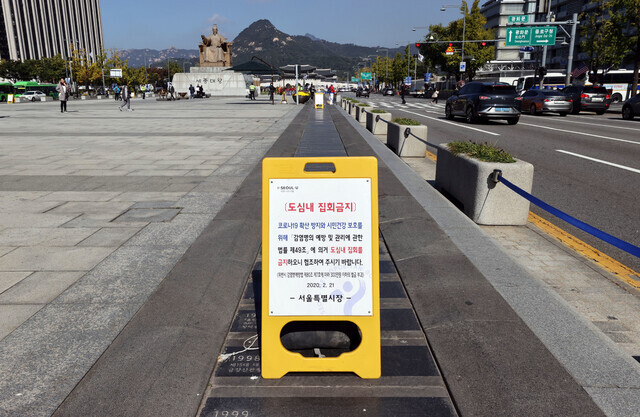hankyoreh
Links to other country sites 다른 나라 사이트 링크
[Column] Democracy in the time of corona


By Park Chan-su, editorial writer
This past weekend, I noticed that the police buses that had been lining Gwanghwamun Square, in downtown Seoul, for three weeks were finally gone. One reason for the removal was that the government had lowered the COVID-19 social distancing restrictions from Level 2 to Level 1. But on a more fundamental level, the police and the government appear to have taken to heart civil society’s concerns about the bus barricades.
If we face another surge of COVID-19 and there are indications that far-right groups are planning to hold a massive rally, the situation could change. But if we are to move closer to the “harmony and balance” under which assemblies and demonstrations can be held while minimizing restrictions on civil liberties during the outbreak of an infectious disease, the police buses should not make another appearance.
It’s significant that a conservative group’s demonstration in downtown Seoul this past Saturday was uneventful even without bus barricades and tense security checkpoints. According to media reports, the police had a presence on the sidewalks and streets where the demonstration was held, but pedestrians and vehicles were not impeded. Around 90 people attended the demonstration, which the authorities had limited to a hundred. The protesters sat in chairs a certain distance apart, and their temperature was checked by police officers, staff from the district office, and the organizers.
Despite the limitations on demonstration size and location, it’s important that citizens were able to express their opinions through loudspeakers. While Korea paid the heavy price of another wave of COVID-19, rallies on Liberation Day (Aug. 15), National Foundation Day (Oct. 3) and Hangul Day (Oct. 9) appear to have brought civic groups and the police toward an understanding on a restrained approach to holding demonstrations and protests.
Government shouldn’t view pandemic as excuse to abuse its powerTo be sure, there could always be another attempt to use a demonstration as a tool for inciting political conflict, as Sarang Jeil Church did. But such an attempt is unlikely to win public approval. Koreans know that such demonstrations, though ostensibly aimed at the government, actually represent a severe threat to public health. Despite extreme actions by the police, such as lining the streets with buses and setting up security checkpoints, opinion polls show that few Koreans think the government has abused its power.
But that shouldn’t be taken as an opportunity for justifying the abuse of law enforcement or government power. The position of the government is that some restrictions on civil liberties are inevitable amid an unprecedented social crisis, but that those restrictions have enabled Korea to contain the disease with greater success than other countries. As of Oct. 12, Korea had a COVID-19 fatality rate of 0.8 people per 100,000, much lower than the US (64.9), the UK (64.8), France (50.3), or even Japan (1.3). This shows the effectiveness of “K-Quarantine,” Korea’s approach to disease control, which has become a gold standard around the world.
It seems reasonable to regard the success of K-Quarantine as being based on Koreans’ high level of community spirit. It was ordinary Koreans who voluntarily cooperated and endured inconveniences on behalf of public safety, before legal debates could emerge about using big data, sharing location information, and tracking smartphones to figure out where infected people had been. Mask usage was made mandatory on public transport by Article 49 of the Infectious Disease Control and Prevention Act, but everyone regards wearing masks in public places as being a civic duty, even if they don’t necessarily recall that legal mandate.
That’s why the government needs to be more cautious about restricting civil liberties under social crises and to take a much more nuanced approach to personal privacy and demonstrations and protests. When dealing with the outbreak of an infectious disease, public buy-in and belief have turned out to be much more effective and important than relying on legal regulations. That makes it even more important to always seek to ensure that the exercise of law enforcement and government authority is based on public support.
A time when dealing with infectious disease isn’t temporary but routineWhen the coronavirus first began to spread in the Chinese city of Wuhan at the end of last year, few if any could have predicted that the pandemic would last for nearly a year. While many expect that a treatment will become available in the first half of 2021, we can’t know that for certain. Even after the coronavirus has subsided, experts say that more pandemics await us down the road. Our fate is to live in a time when infectious disease is not temporary but routine.
Rather than focusing on temporary restrictions on civil liberties, I think this is a time that requires democratic principles and agreements suitable for a new era. It’s urgent that we frame and apply new rules for every action, no matter how small, including weekend demonstrations downtown. If the lines of buses barricading plazas are unsightly, we should respond by developing new equipment, such as tough plastic screens that can prevent illegal actions that undermine disease control without completing shutting down traffic.
We also need to persuade the public that location information collected by smartphones will absolutely not be used by the government or corporations for their own advantage and to take legal and institutional measures toward that end. The realm of politics is no exception. Those who regard demonstrations and protests as merely being a tool for political attacks lag far behind the general public and its advanced community spirit. Discussions and debates of this sort represent the first step toward defending democracy in the era of infectious diseases.
Please direct comments or questions to [english@hani.co.kr]

Editorial・opinion
![[Column] Season 2 of special prosecutor probe may be coming to Korea soon [Column] Season 2 of special prosecutor probe may be coming to Korea soon](https://flexible.img.hani.co.kr/flexible/normal/500/300/imgdb/original/2024/0426/3317141030699447.jpg) [Column] Season 2 of special prosecutor probe may be coming to Korea soon
[Column] Season 2 of special prosecutor probe may be coming to Korea soon![[Column] Park Geun-hye déjà vu in Yoon Suk-yeol [Column] Park Geun-hye déjà vu in Yoon Suk-yeol](https://flexible.img.hani.co.kr/flexible/normal/500/300/imgdb/original/2024/0424/651713945113788.jpg) [Column] Park Geun-hye déjà vu in Yoon Suk-yeol
[Column] Park Geun-hye déjà vu in Yoon Suk-yeol- [Editorial] New weight of N. Korea’s nuclear threats makes dialogue all the more urgent
- [Guest essay] The real reason Korea’s new right wants to dub Rhee a founding father
- [Column] ‘Choson’: Is it time we start referring to N. Korea in its own terms?
- [Editorial] Japan’s rewriting of history with Korea has gone too far
- [Column] The president’s questionable capacity for dialogue
- [Column] Are chaebol firms just pizza pies for families to divvy up as they please?
- [Column] Has Korea, too, crossed the Rubicon on China?
- [Correspondent’s column] In Japan’s alliance with US, echoes of its past alliances with UK
Most viewed articles
- 1Why Kim Jong-un is scrapping the term ‘Day of the Sun’ and toning down fanfare for predecessors
- 2After election rout, Yoon’s left with 3 choices for dealing with the opposition
- 3Two factors that’ll decide if Korea’s economy keeps on its upward trend
- 4‘We must say no’: Seoul defense chief on Korean, USFK involvement in hypothetical Taiwan crisis
- 5AI is catching up with humans at a ‘shocking’ rate
- 6Noting shared ‘values,’ Korea hints at passport-free travel with Japan
- 746% of cases of violence against women in Korea perpetrated by intimate partner, study finds
- 8Why Korea shouldn’t welcome Japan’s newly beefed up defense cooperation with US
- 9Amnesty notes ‘erosion’ of freedom of expression in Korea in annual human rights report
- 10Ethnic Koreans in Japan's Utoro village wait for Seoul's help